
I was a slow starter with digital because of my early take on CD sound: It was emotionally drained with grumbling distortions in the bass and an off-timbre midrange, crowned by a thin, artificial treble, and penetrated by an eerie, unnatural silence whenever the musicians stopped playing. I thought cassettes had higher fidelity and that CDs would be a passing fad, but I kept browsing CDs at Tower Records, and the itch to buy some was getting pretty strong.
One of my friends said, "Maybe it's not the conversion principle that's to blame but something else, like an imperfect CD player?" That interesting thought had not occurred to me, and it obviously occurred to lots of engineers, because they are still trying to improve the quality of CD playback by adjusting the mechanism.
My friend's thought prompted me to ask my engineer pal, a short-tempered wizard named Dick, what CD player he used. He responded in his best gruff know-it-all voice, "These new CD players are shit! Don't buy one until they make one where the transport mechanism floats!" When I asked if anybody made one that floated, he said that he used a portable, battery-powered Optimus CD player from Radio Shack, and that its transport mechanism floated, and that it sounded better than any audiophile deck.
Dick "knew things," so I believed him.' When I got to Radio Shack and saw the player he recommended, I laughed at its plastic-toy flying-saucer style. It looked the opposite of serious, but a closer inspection and a quick listen with its included headphones suggested there might be some good engineering hidden beneath its UFO casework. The more I examined the Optimus, the more it seemed perfect for my workbench, my bike, and my car. It cost around a hundred bucks, so I bought one and kept it as my only CD player until 1993, when I capitulated and bought my first nonportable CD player: a TEAC VRDS-10.
Diese Geschichte stammt aus der September 2024-Ausgabe von Stereophile.
Starten Sie Ihre 7-tägige kostenlose Testversion von Magzter GOLD, um auf Tausende kuratierte Premium-Storys sowie über 8.000 Zeitschriften und Zeitungen zuzugreifen.
Bereits Abonnent ? Anmelden
Diese Geschichte stammt aus der September 2024-Ausgabe von Stereophile.
Starten Sie Ihre 7-tägige kostenlose Testversion von Magzter GOLD, um auf Tausende kuratierte Premium-Storys sowie über 8.000 Zeitschriften und Zeitungen zuzugreifen.
Bereits Abonnent? Anmelden
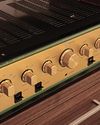
German kitchens, Japanese amps, and Afropop gems
BRILLIANT CORNERS - I have a day job at a museum. One of my favorite things about working there is taking the elevator from my office down to one of the floors open to the public; I walk into the galleries through a discreet panel in the wall. This makes me feel like I'm in one of those horror-movie manors with a tunnel concealed behind a bookshelf. Sometimes I startle people, which I kind of enjoy.
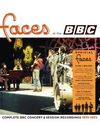
EDITOR'S PICK - RECORDING OF THE MONTH
The record business was awash in money and power. Vinyl LPs were still five bucks, and while the pressings could be suspect, the music-buying public still snapped them up en masse.
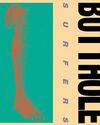
The Butthole Surfers wipe out
REVINYLIZATION - Music's lunatic fringe drifts further out every hour. As it should. In this century, with computers playing an ever-larger role, music continues to fragment and become infinitely more varied. This splintering is either the essence of what keeps it relevant as an art form or something profoundly disturbing, to be hated and feared.
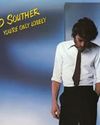
You're only lonely
AURAL ROBERT - The least surprising story in music today is the inevitable passing of irreplaceable talent. Tenor saxophonist Benny Golson died at age 95 the day I finished this salute to another fallen star, Southern California singer/songwriter John David \"JD\" Souther.
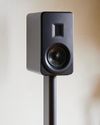
PS Audio Aspen FR5 - LOUDSPEAKER
I remember the first PS Audio product: a simple phono stage. It was so simple - a passive RIAA eq filter flanked by a pair of primitive op-amps - that when the schematic was made public, I built one myself; I was in the midst of my DIY years. I thought it was, to use a word from that time, nifty.
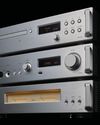
TEAC UD-701N - STREAMING PREAMP, D/A CONVERTER
In Gramophone Dreams #88, I described the sound of TEAC's VRDS-701T CD transport as \"dense and precise in a way I had never previously heard from digital.\" I went on to explain, \"by dense, I mean there was a tangible corporeality effected by seemingly infinite quantities of small, tightly packed molecules of musical information.\"
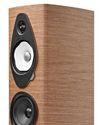
Sonus faber Sonetto V G2 - LOUDSPEAKER
Here's a hard truth: A written review of a full-sized speaker any speaker, really-is, at best, semi-useful. We all listen differently, we have different musical tastes, our system electronics are different, and our listening rooms vary a lot. You will gain a general picture of a speaker's capabilities and foibles from John Atkinson's measurements, and I can tell you how the speakers sound to me, in my room. But that's it. You need to hear them for yourself before making a buying decision. The best I can do is tell you how my music brain felt when the speakers were in my house and making music.
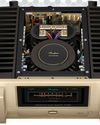
STEREOPHILE'S 33RD ANNUAL - PRODUCT OF THE YEAR AWARD 2024
When Stereophile's Product of the Year Awards were first published, in 1992, we decided that unlike some other publications and their awards schemes, we would keep the number of categories to a minimum. That way, we would avoid what the late Art Dudley once described as the \"every child in the class gets a prize\" syndrome.
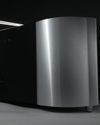
Moon 861 - POWER AMPLIFIER
It is unusual to begin a review with a detailed discussion of setup. But setup protocol for the Moon 861 power amplifier ($22,000 each), the top-level amplifier in the North Collection from Moon, which I reviewed bridged in mono, proved crucial to its sound.
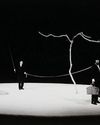
Mobile Fidelity, PrimaLuna, and First Watt redux
GRAMOPHONE DREAMS - It's important for readers to remember that I've spent my adult life as an artist and mechanic. Making things. Working as a tradesperson during the day then at an easel or workbench at night.